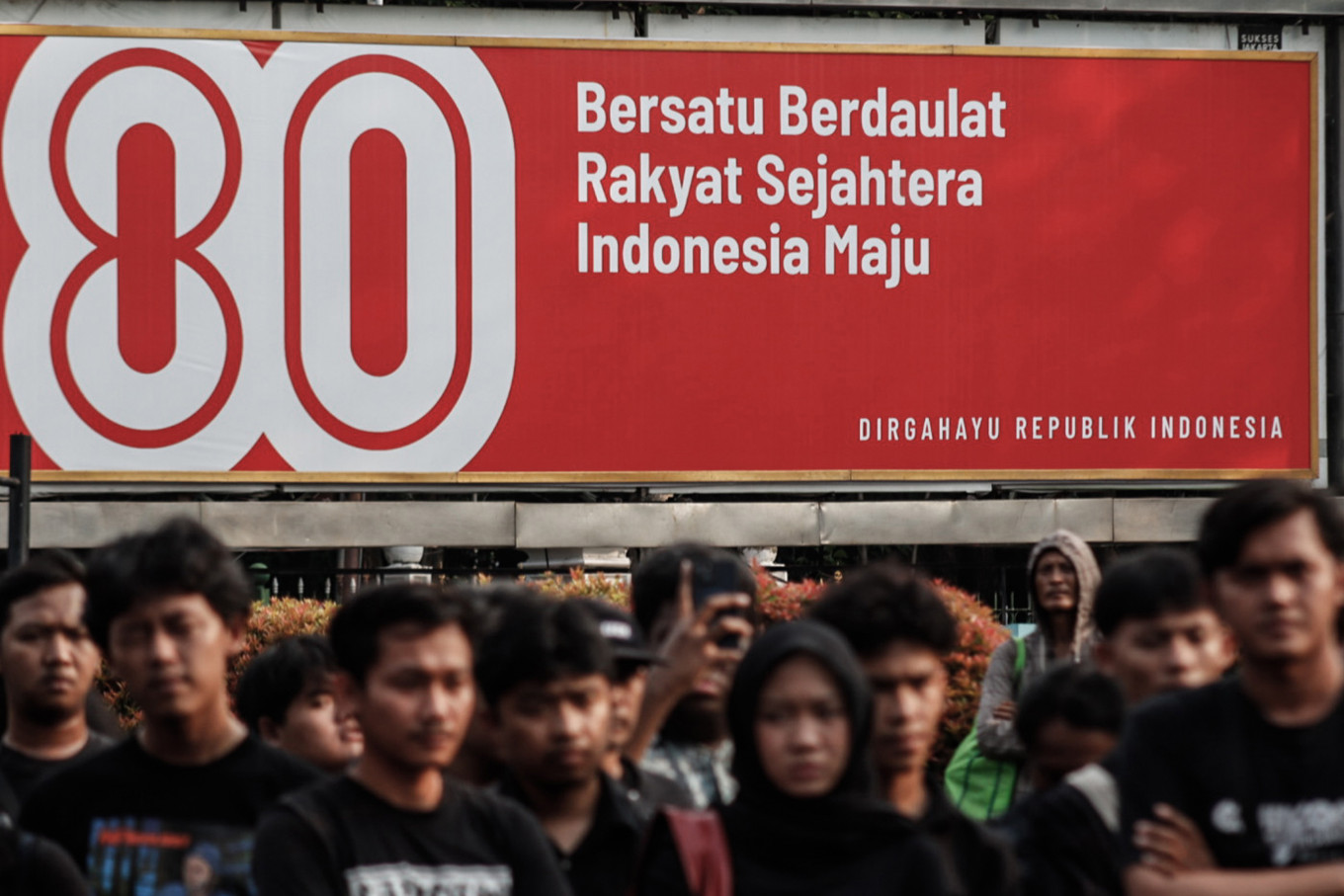Popular Reads
Top Results
Can't find what you're looking for?
View all search resultsPopular Reads
Top Results
Can't find what you're looking for?
View all search resultsThe age of nationalism
As Indonesia celebrates its 80th year of Independence this week, it is high time for everyone in the country to reflect on the state of its nationalism.
Change text size
Gift Premium Articles
to Anyone
 Human rights activists participate in the 873rd Kamisan rally on Aug. 14, 2025, in front of a banner celebrating the 80th anniversary of Indonesia’s independence near the State Palace in Central Jakarta. Held every Thursday since 2007, the Kamisan highlights past human rights violations, such as those that occurred during then-president Soeharto’s New Order regime. (Antara/Muhammad Rizky Febriansyah)
Human rights activists participate in the 873rd Kamisan rally on Aug. 14, 2025, in front of a banner celebrating the 80th anniversary of Indonesia’s independence near the State Palace in Central Jakarta. Held every Thursday since 2007, the Kamisan highlights past human rights violations, such as those that occurred during then-president Soeharto’s New Order regime. (Antara/Muhammad Rizky Febriansyah)
I
n the waning years of the 20th century, at the moment when globalization reached its apogee, a virulent strain of nationalism appeared on the horizon.
A response to the exogenous shocks brought about by globalization, this brand of nationalism sought to reassert a nationhood defined by the ability to cultivate one’s own traditions.
And since traditions can be a malleable concept, the easiest way for nationalists is to set up boundaries based on ethnicity and race.
If needs be, the delineated boundaries of that nationalism have to be defended with military power.
Hence, the link between nationalism and militarism.
In recent years, we have witnessed the resurgence of this toxic strain of nationalism, even in the most cosmopolitan countries and regions of the world.
In the United States, President Donald Trump’s desire to purify the country from “alien” culture has led to the deployment of military and paramilitary forces to raid and deport immigrants to detention centers in foreign countries.
The desire to build a monolithic culture has also led to the shutting down of the discourse of diversity and multiculturalism that has long been the feature of an immigrant culture like the US.
In Israel, an extreme form of ethno-nationalism has not only led to an absolute militarization of society, it also has resulted in what the world now recognizes as a genocide.
Today in Gaza more than 2 million people are being starved and massacred on a daily basis as a predictable outcome of years of dehumanizing a group of people on the other side of the wall.
No less worrying is the trend in Europe, the place where an experiment with ethno-nationalism ended up in the extermination of 6 million Jews.
A series of public opinion polls published earlier this week found that for the first time in modern history, far-right parties are simultaneously topping the polls in Europe’s three main economies of Germany, France and the United Kingdom.
The experience of Italy, where a far-right party governs in moderation, should be enough to calm many fears, but these parties’ nativist rhetoric and programs could set back the work of promoting just and equitable societies, a project that is now a distant dream on the other side of the Atlantic.
As Indonesia celebrates its 80th year of independence this week, it is high time for everyone in the country to reflect on the state of its nationalism.
With the Red and White flying high, military parades becoming more frequent and the government playing an ever-greater role in the economy, it looks like Indonesia is not immune to the global trend.
And in a place where the dominant ideology has mostly been defined by flag-waving politicians and military generals, it is easy to fall into the trap of ethno-nationalism.
These days, we hear a more and more familiar refrain of “foreign intervention” or “plot against the nation” uttered by those in the government whenever there are protests against government policies.
The imagined threat of war and/or foreign intervention has become the pretext for the military to expand its presence not only geographically by spreading out in more regions but also bureaucratically, with military personnel playing a direct role in civilian affairs.
There is also a growing tendency for an “economic nationalism” whereby the state decides to play a major role in the economy, pumping money and resources into programs and projects to create growth.
Another feature of this economic nationalism is the decision by the state to control resources deemed crucial for the improvement of people’s welfare.
Almost 30 years ago, at the start of the Reform era, Indonesia started a new project to tone down some of the most virulent strains of nationalism by introducing regional autonomy, military reform and setting up guardrails around individual rights and liberties.
That project is still unfinished and the next two decades will be crucial in deciding what kind of nation future generations will inhabit in the next century of its existence.










